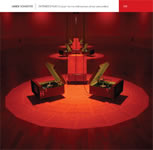|
|
 |
Dusted Reviews
Artist: Janek Schaefer Album: Extended Play (Triptych for the child survivors of war and conflict) Label: Line Review date: Jul. 29, 2008 |

|
|
|
 |
Documenting an installation on disc can’t be easy. A total experience that makes sense within a particular space – in this case, a red-lit room in the Huddersfield Art Gallery – may be diminished by the act of reducing it to mere sound on a CD. And when, as in this case, the piece is interactive, there’s no recreating the audience’s experience of actually participating in making the music. Janek Schaefer’s solution has been to create a special CD version that uses the installation’s sonic elements, but makes several unique and unabashedly constructed pieces out them that downplay the original installation’s chance qualities. It may not be the same as being there, but it has the best possible chance of standing on its own, and in this case the result is a strikingly emotional work.
Extended Play’s initial inspiration came from a fairly ordinary, yet life-changing moment in Schaefer’s life. When his first child was born in 2005, he got to thinking about the circumstances of his mother’s life at the corresponding age; one infant was born into the weird mixture of safety, comfort, economic insecurity, and random political terror enjoyed by contemporary residents of London, the other into the decidedly harsher and more immediate threats of Warsaw, Poland during WW II. Schaefer’s favorite means of manipulating sounds is the turntable, but he is less performance-oriented than Philip Jeck or your average hip-hop DJ. Rather, he collects sounds, tethers them to ideas, and sees where the two take each other. For the raw material for Extended Play, he lifted some melodies from “Tango Lyczakowskie,” a patriotic Polish folk song that was broadcast by BBC World Service to Polish resistance fighters in order to convey encoded information on the day that his mother was born in 1942. Schaefer and co-composer Michael Jennings fashioned this material into a 10-minute piece of chamber music for violin, cello and piano, then Schaefer pressed each instrument’s part onto a 7” record.
In the installation version, three record players set to different speeds each play a record of each instrument; motion sensors cut the power to each turntable as a person passes, thereby making each observer a participant in the creation of something they can’t foresee and can’t really control. Of course, such an experience is impossible to create on record, so Schaefer has instead focused on the records themselves. The first three tracks isolate single instruments. Intermittent groove crackle, the occasional thump of a needle picking up and restarting, and the shudder of records stopping when the power’s cut reinforce the inherent melancholy of “Vinyl Cello Duo.” This is minimalism, both in sound and method; not only does Schaefer work with minimal resources (two records), he makes the most out of a few long tones and simple phrases. “Vinyl Piano Duo” is sparser, placing silence on a nearly equal footing with the slightly distorted, generously reverb’d piano figures. This could almost be ambient music for a rainy day in a room with a hissy radiator, but the slurs generated by turntable stops and starts disrupt any sustained reverie. The ascending melody reminds me a bit of the licks Robert Wyatt played on Eno’s Music For Airports, but the built-in disruption and heaviness of mood make this the perfect soundtrack for the realities of modern air travel. It’s great, but don’t expect it to come to a terminal near you anytime soon.
“Vinyl Violin Duo” is of a piece with what has come before; the penultimate track, “Acoustic Ensemble,” which was crafted using the original recordings of the instruments played at different speeds. Although it eschews the use of turntables, it might come closest to the installation experience on account of its greater density of event. It’s certainly the most deeply involving and demanding piece of music. 24 minutes long and none too hasty, it requires you sink to into what is essentially a long, oddly cyclic piece of chamber music. The fuller sound and more intricate instrumental interaction also impart a greater emotional complexity. As strings and keys sweep up in pitch, they dispel the duos’ dolor and usher in an aura of hope as well as gravity. The record closes with a collage of the source tune, radio announcements and vintage shortwave noise that gives the whole thing a decided Conet Project vibe.
Schaefer has previously conveyed his anti-war sentiments via song titles, but here it is the music’s evocation of dignity that makes the point. It reminds me of the line in the movie The Lives of Others where a character muses that Karl Marx once said that he couldn’t listen to Beethoven’s “Appassionata” anymore because it made him want to pat people’s heads rather than beat on their skulls. Add this to the music that not only dissents from such methods; it offers visions of gentler way to change hearts.
By Bill Meyer
|







